_We may earn revenue from the products available on this page and participate in affiliate programs. Learn more ›
_
Best Overall
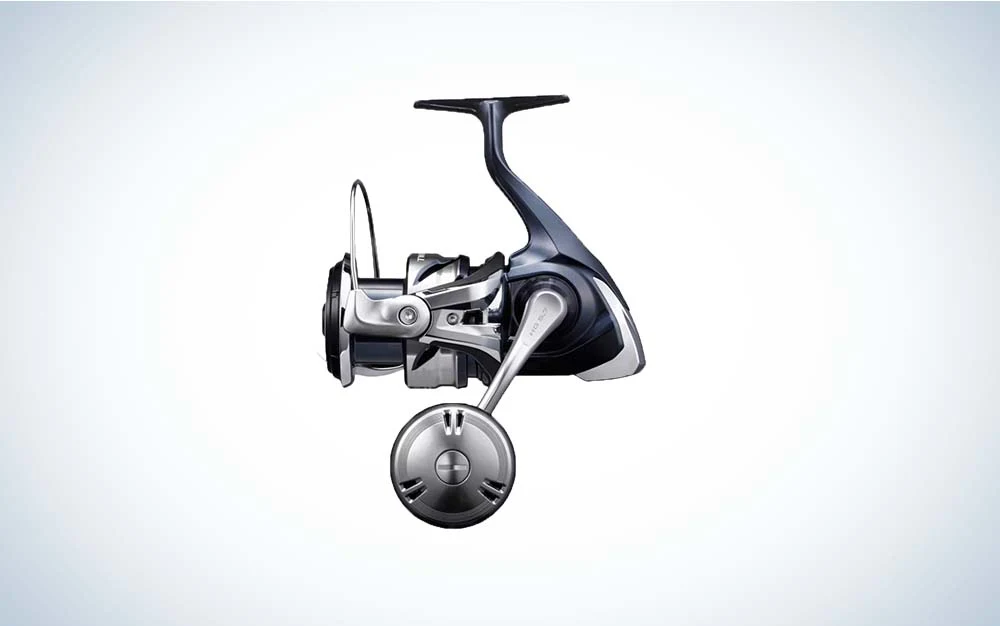
Shimano Twin Power
Best Baitcaster
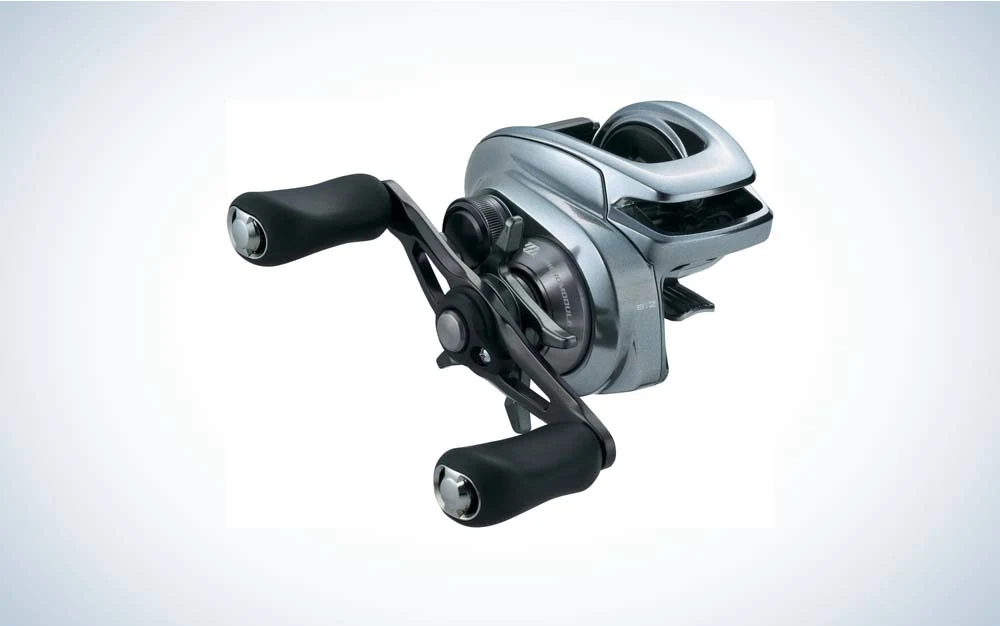
Bantam MGL
Best Value
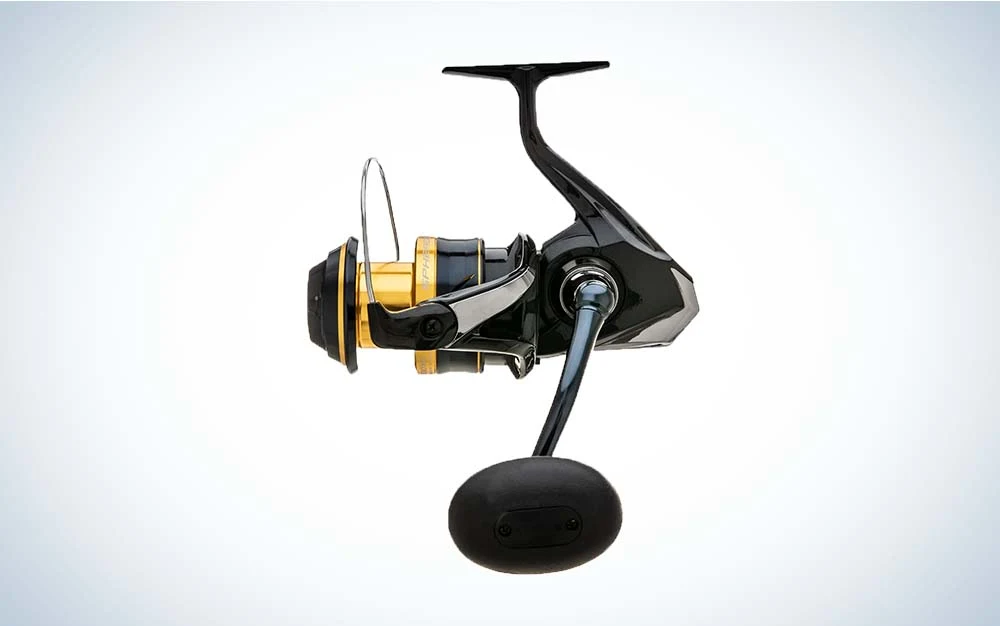
Spheros SW 5000
This winter, I set out to test some of the best Shimano reels available, from spinning reels
to baitcasters
. The test logistics included many moving parts like target species, reel size, and application. But the idea was to create a one-stop review that included Shimano reels for both freshwater and saltwater game fish.
To start, I researched for hours and talked to the Shimano team to find out what they recommended for the categories I wanted to cover. This included inshore fishing, bass fishing, budget angling, and something to handle larger saltwater game fish.
I then booked a flight to Florida and spent a month chasing both freshwater and saltwater species across the entire state. The final results—which you are about to see—included some of my new personal best fish, a variety of species, drag testing, and endless casting and retrieving. Here are the best Shimano reels you can buy now.
The Best Shimano Reels
Best Overall: Shimano Twin Power SW 4000
Best Spinning Reel for Freshwater: Shimano Vanford 3000
Best Baitcaster: Shimano Bantam MGL
Best for Larger Saltwater Gamefish: Shimano Saragosa SW 5000
Best Value: Shimano Spheros SW 5000
Best Overall: Shimano Twin Power 4000
Best Overall

Specs
Reel Size: 4000
Gear Ratio: 6.2:1
Line Capacity: 12/195
Max Drag: 24 pounds
Pros
Lightweight but powerful
Smooth drag
Sealed body for improved durability
Cons
Expensive
You’re looking at the most versatile and impressive Shimano reel I tested. The Twin Power comes in six different sizes—I opted for the 4000 model. The lightweight design and advanced line management technology made the Twin Power the furthest and smoothest casting reel of the test.
Shimano’s aero wrap technology—which features a two-speed oscillation system that layers the line onto the reel in a precise crisscross pattern—ensured my line never caught onto itself when coming off the reel. The propulsion line management system also increases casting distance through an ergonomically shaped spool lip, decreasing line friction and making for a further cast.
The most impressive features of this reel are its stopping power and buttery smooth retrieve. The Twin Power showed me just that when a 40-inch barracuda smashed my topwater tube. The reel handled the ensuing runs from this ferocious fish with ease, allowing the fish to go when needed, but also stopping the cuda instantly when I put on the brakes. I had the same experience when I hooked what would have been my personal best snook. The initial run from this 30-plus-inch fish was strong, but the smooth drag performed flawlessly, allowing me to stop the fish and turn it back towards the boat before it made an acrobatic leap and spit the hook.
It was the same story for every big inshore fish I hooked throughout the entire test. The drag was smooth and powerful, giving me full trust when I buried the hook into a giant. I paired this reel with a 7-foot, 6-inch Bubba tidal pro heavy rod. It balanced perfectly and provided the ideal setup for inshore fishing.
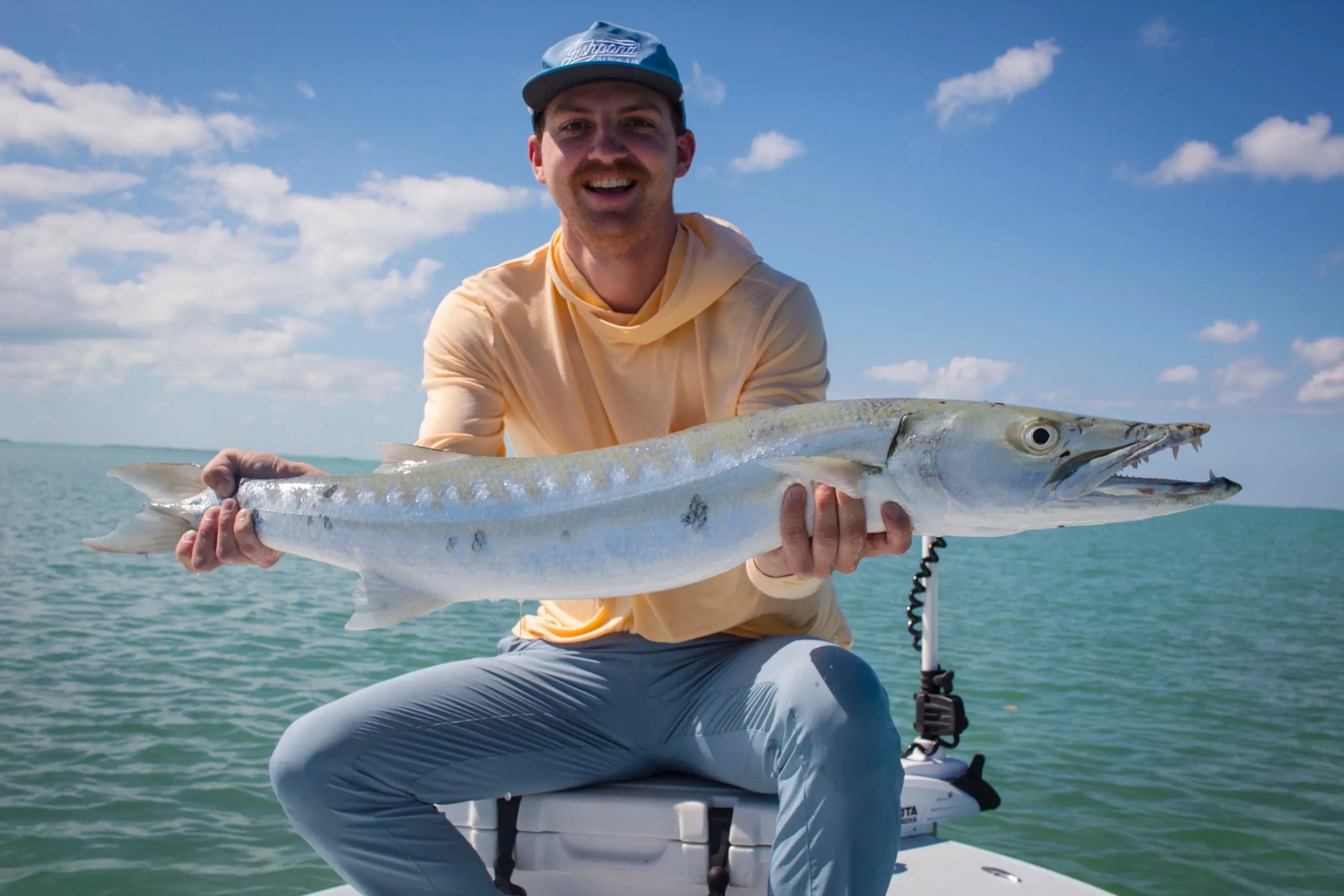
The author with a 40-inch barracuda caught on the Shimano Twin Power in the Florida Keys. Ryan Chelius
The Twin Power 4000 retails for $550, and I consider this a premium reel. But for the diehard inshore angler, the tight water-resistant seal, paired with the increased casting technology and lightweight but powerful design, make this one of the best saltwater fishing reels you can find on the market.
Best Spinning Reel for Freshwater: Shimano Vanford 3000
Best Spinning Reel for Freshwater
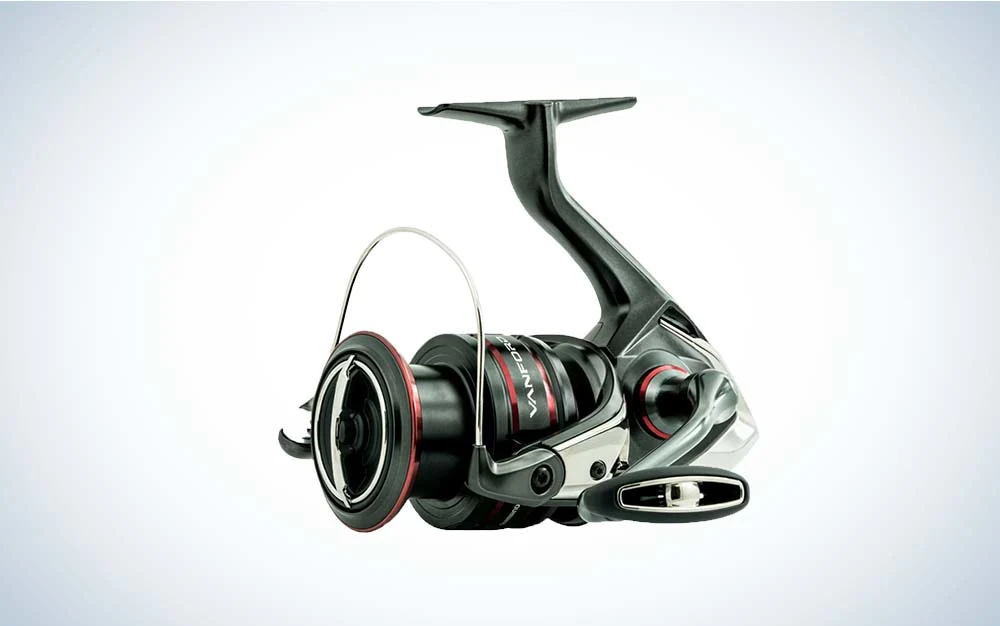
Specs
Reel Size: 3000
Gear Ratio: 6.4:1
Line Capacity: 10/140
Max Drag: 20 pounds
Pros
Lightweight
Versatile for freshwater and saltwater species
Effortless startup inertia
Cons
Little line capacity
The Shimano Vanford is the perfect light tackle reel. It is versatile and can be used for both freshwater and saltwater species. I did most of my Vanford testing on small freshwater ponds and saltwater canals. My 3000 model proved to be lightweight with a smooth drag and good casting distance.
My best day with the Vanford came at a local pond that produced a strong peacock bass bite. These colorful fish are known for being aggressive and powerful. The Vanford handled medium-sized peacocks with ease, helping pull these bass out of heavily wooded structure and vegetation. The drag is smooth, with a flawless startup inertia, and horsed bass out of cover without issue.
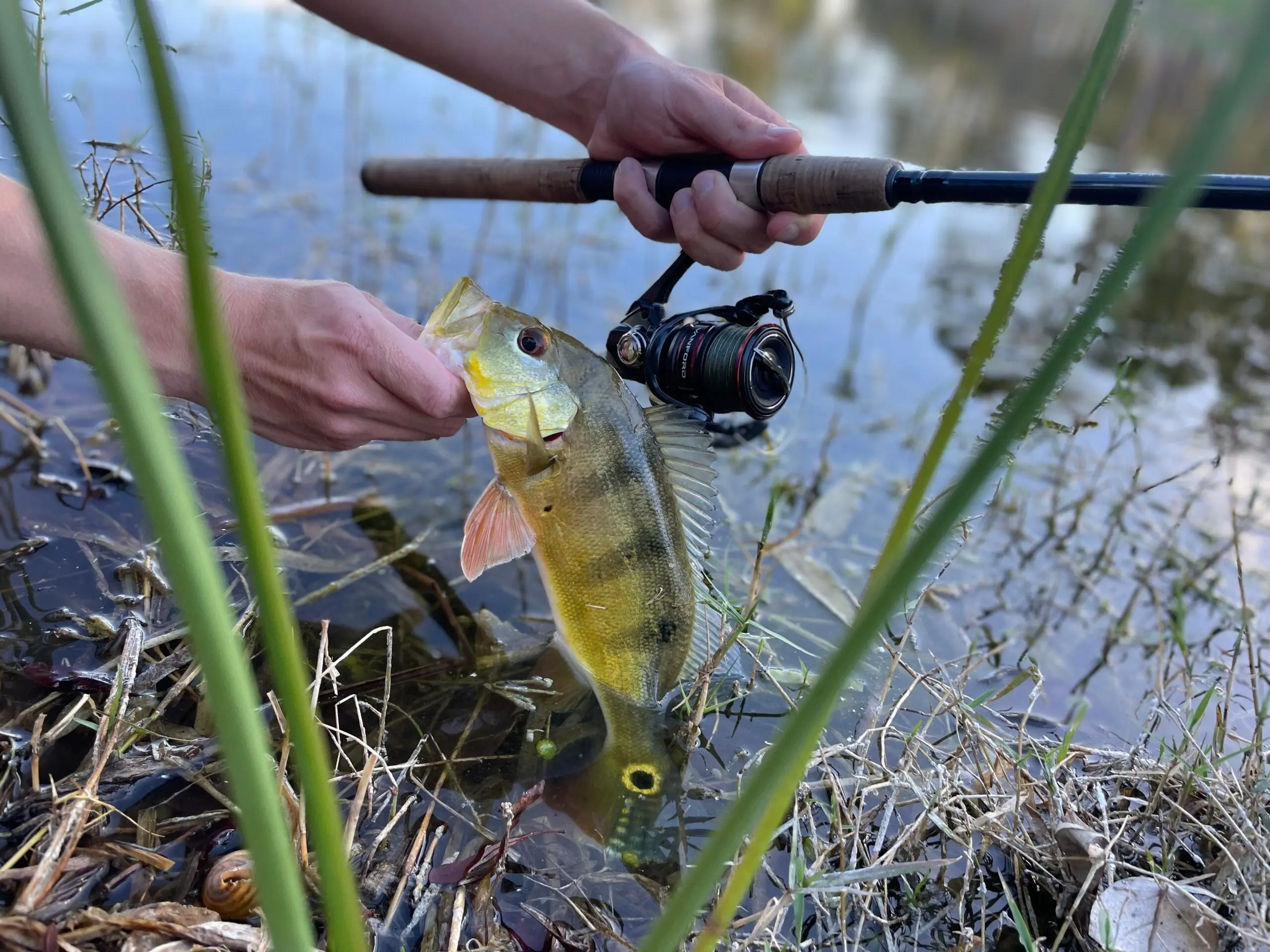
The author holding a small peacock bass caught on the Shimano Vanford. Ryan Chelius
This reel is also ideal for finesse fishing, whether with drop-shots, ned rigs, or small swimbaits for saltwater fish on the flats. The Vanford’s wide range in sizes makes it one of the most versatile reels in the test. On the smaller end, the 500-size reel can be used for ice fishing, while the 4000/5000-size models are perfect for inshore fishing. That’s right, this reel can do just as well in the salt due to the water channeling construction that improves water resistance and durability.
I was surprised with how well the reel casts, even with light lures. I never had a problem throwing baits a good distance, and the line came off the spool quickly and smoothly. While I would lean towards a Twin Power or Spheros for bigger saltwater fish, the Vanford is my choice for freshwater finesse fishing and light tackle saltwater adventures.
Best Baitcaster: Shimano Bantam MGL
Best Baitcaster

Specs
Gear Ratio: 6.2:1
Line Capacity: 12/110
Max Drag: 11 pounds
Pros
Aluminum lightweight body
Comfortable in-hand feel
Smooth casting and minimal backlashing
MGL spool improves casting
Cons
Expensive
The Bantam is one of the best baitcasting reels I’ve ever used. While this low-profile baitcaster can be used for a variety of species, I did most of the Bantam testing while bass fishing. It is built from a one-piece aluminum frame, which makes this reel extremely lightweight and durable. My model included a 6.2:1 gear ratio, which is on the slower end for the Bantam line, but I had no problem burning baits back to the boat.
I did a big chunk of the Bantam testing on Headwaters Lake—a trophy bass fishery—in Fellsmere, Florida. I paired the Bantam with a 7-foot medium/heavy rod, and threw everything from topwater frogs and moving baits to jigs and giant swimbaits. The Bantam made long precise casts no matter the lure. The reel handled all of my 3- to 4-pound bass perfectly and is what I want on my rod when I do stick a true giant.
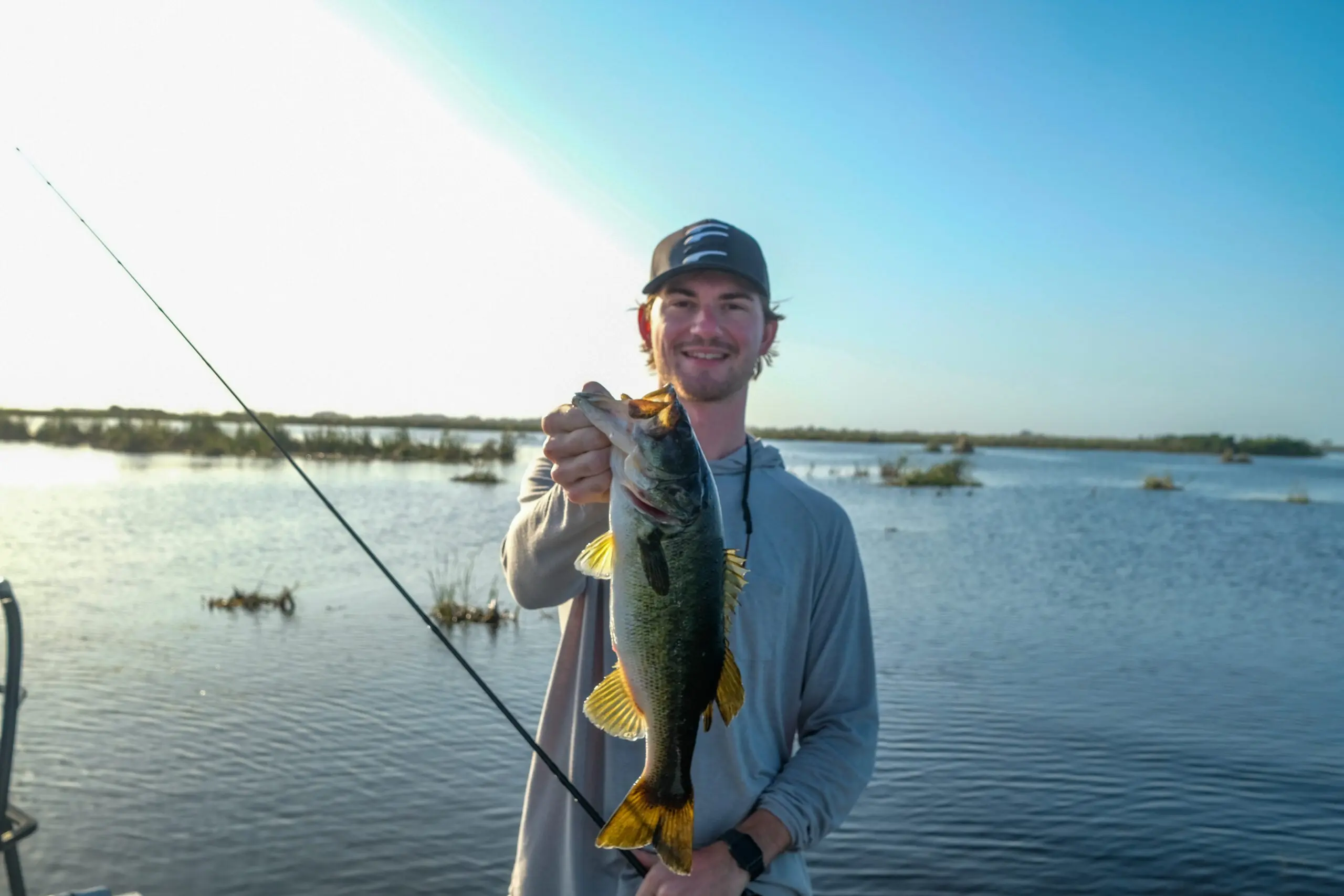
The author’s friend with a nice largemouth bass caught on the Shimano Bantam. Ryan Chelius
I continued the Bantam testing on various ponds throughout Florida while chasing snakeheads. These prehistoric-looking fish live in thick vegetation that requires true power to successfully pull out and land. And that’s exactly what the Bantam did when I stuck a solid snakehead on a frog. I have no hesitations about this reel’s power or ability to handle trophy fish—it’s a great addition to any baitcasting combo
.
Best for Larger Saltwater Gamefish: Shimano Saragosa SW 5000
Best for Larger Saltwater Gamefish
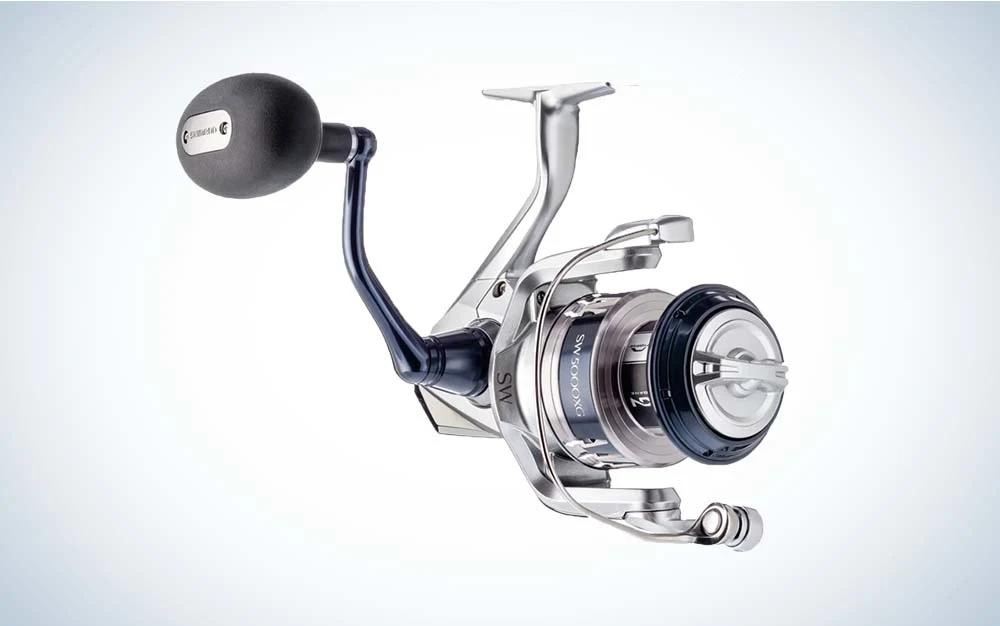
Specs
Reel Size: 5000
Gear Ratio: 6.2:1
Line Capacity: 12/195
Max Drag: 22 pounds
Pros
Built for offshore saltwater fishing
Waterproof body and drag
Stainless steel one-piece bail
Flawless casting
Powerful drag
Cons
Expensive
When it comes to big tarpon, striped bass, sharks, or any larger saltwater game fish, you want a reel that can handle strong, blistering runs—and the Saragosa SW is more than capable. This was my reel of choice when targeting big tarpon in South Florida. While I was unsuccessful in landing a silver giant, I still hooked plenty of other fish to get a true feel for this reel.
For starters, the Saragosa is a tried and true saltwater reel built to handle big fish. This means the Saragosa is going to help you manage and put the brakes on giants during long fights. I got a firsthand look at the reel’s stopping power when I tossed a live mullet into a school of 60- to 80-pound tarpon. It was almost an instant take, and the smooth drag quickly engaged before the hook came out. Shortly after, I stuck what I thought was a smaller tarpon, but turned out to be a 30-plus pound jack. I know that doesn’t sound very impressive, but anyone who has battled jacks knows their brute strength, and a 30-pounder was no joke. The Saragosa performed amazingly during multiple fights with these strong fish.
For anglers looking to target even bigger fish, the Saragosa comes in a variety of sizes going all the way up to 25000. The fully sealed body prevents saltwater intrusion and corrosion while drastically increasing the lifespan of the reel. After (accidentally) dunking the Saragosa into the salt one morning, the reel still went on to function like new. While I don’t recommend doing this, it’s nice to know it can withstand full submersion.
Best Budget: Shimano Spheros SW 5000
Best Budget

Specs
Reel Size: 5000
Gear Ratio: 6.2:1
Line Capacity: 14/165
Max Drag: 22 pounds
Pros
Offered in a variety of sizes
Strong pinion gear support
Good water resistance and durability
Affordable
Cons
Lacks premium features for casting distance
The Shimano Spheros SW 5000 is an all-around budget inshore saltwater reel. The new updated models have Shimano’s infinity drive technology, a fancy way of saying they improved the pinion gears, which increases the overall strength of the reel. I caught a variety of inshore fish on this reel, including snook, barracuda, and jacks. The fully sealed drag system handled these medium-sized fish without issue, providing good stopping power.

The author with a snakehead caught during the reel test on a topwater frog. Ryan Chelius
The Spheros lacked in casting distance, but this was expected for a budget-priced reel. That doesn’t mean you can’t reach fish up on the banks, but you will fall short in a casting competition with Shimano’s other higher-end models. I was thoroughly impressed with the performance—especially the drag—of this lower priced reel. Frankly, it has a spot on every saltwater angler’s boat, whether you use it a few times a year or you’re on the water five days a week and need a reliable backup. The Spheros also comes in seven different sizes, so there’s an option for you no matter what species you chase.
How We Tested Shimano Reels
For the test, I traveled to the fishing capital of the world—Florida. Here I had the chance to chase a variety of saltwater and freshwater species. I spent over a month in the Sunshine State, in some of the most famous fisheries in the world, like Lake Okeechobee, Florida Bay, Florida Keys, and Headwaters Lake.
Most of the test was spent on Field & Stream contributor Max Inchausti’s 18-foot Beavertail Vengence flats boat
. We started by poling the flats in the Florida Keys for tarpon, snook, and redfish
. We did the same in Florida Bay and continued the saltwater expeditions in the intercoastal shores of Southeast Florida, as well as Estero Bay, the Imperial River, and the Sebastian River.
On the freshwater side of things, we spent a weekend on the trophy bass lake that is Fellsmere Reservoir (aka Headwaters Lake). I also made sure to put in the miles on foot to test the lighter reels—pond hopping in search of largemouth bass, snakehead, and peacock bass.
Each reel was spooled up with the following Power Pro braided line.
Twin Power Spinning Reel: 30-pound test
Vanford Spinning Reel: 15-pound test
Bantam Baitcasting Reel: 15-pound test
Saragosa Spinning Reel: 40-pound test
Speheros Spinning Reel: 30-pound test
Depending on where I was and what species I was chasing, the reel selection differed. But no matter what I was using, the criteria stayed the same. I looked for casting ability, stopping power (drag), balance, handling, and durability. At the end of my month-long fishing binge, each reel had been put through the wringer, and I found that each reel fell into its own category.
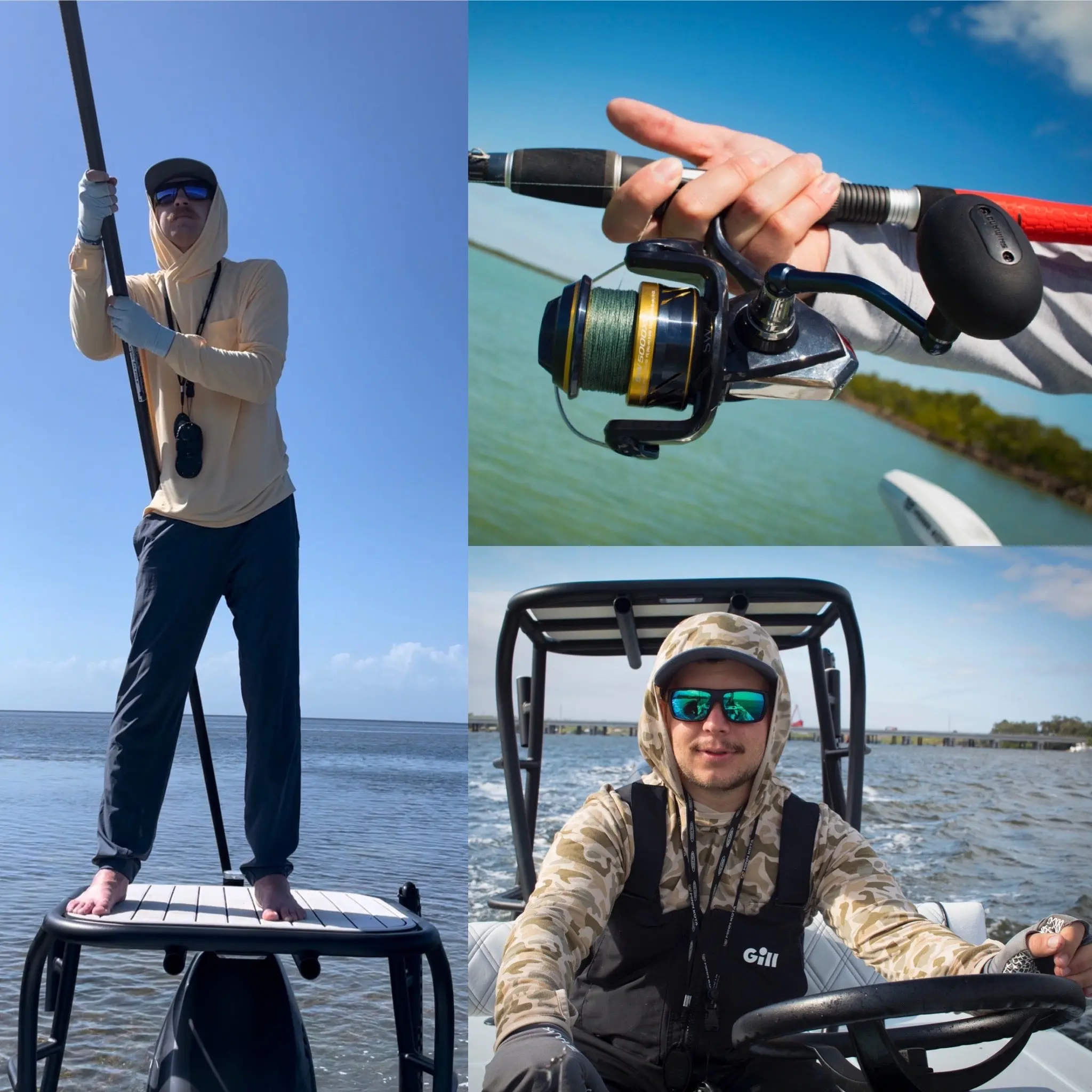
Clockwise from top left: The author poling the flats in Florida Bay; the Shimano Spheros SW; Max Inchausti driving the 18-foot Beavertail Vengence on the Sebastian River.
Shimano Reels Buying Guide
Selecting a fishing reel isn’t as simple as just grabbing the first reel on the shelf and giving it a few cranks. You need to think about reel size, drag, gear ratio, and, most importantly, fishing application. Where you fish and what species you target is going to be the biggest determining factor in reel selection. Once you narrow that down, you can start to look at build quality, waterproof sealing, durability, and more. Here are four main considerations before buying a Shimano or any other fishing reel.
Fishing Application
While many reels can be used in both freshwater and saltwater, some are specifically designed to handle the brutal and corrosive conditions of the salt. This should be your first consideration. Are you planning to fish in freshwater or saltwater? Fully sealed reel bodies and drags make for a much more durable and stronger reel that will excel in saltwater environments.
Next, think about the species you plan to target as well as your fishing technique. This will help point you in the right direction for either a spinning or baitcasting reel, as well as size, drag, and casting ability.
Materials/Construction
Reel construction is going to determine the weight, feel, durability, and life span of a reel. Most Shimano reels are built with a hagane metal body that allows for strong rigidity and improved durability by limiting flexing and increasing the overall strength of the reel. Depending on the model, Shimano offers a variety of unique technologies that improve performance. Some included on the reels recommended above include:
Propulsion Line Management System: The new spool lip design allows the line to come off the reel easier and smoother, making for longer casts and minimal backlashes and wind knots.
X Shield Sealing: This technology seals the internals of the reel at 12 locations and creates an extremely water-resistant body that helps prevent corrosion and increase durability.
Aero Wrap Technology: This features a two-speed oscillation system that layers the line onto the reel in a precise crisscross pattern, making sure the line doesn’t catch itself when it comes off the reel.
Drag
The drag is one of the most important components of a fishing reel. Depending on the setting, it allows the reel to rotate backward, letting out line when a fish makes a run so the line doesn’t break. A smooth drag is crucial to successfully fight and land fish. Different size reels will feature different max drag capacities—the amount of weight a reel can handle before the line snaps—which should be appropriately matched to the target species.
Size/Line Capacity
The size of your reel should match the species you’re chasing and your style of fishing. Reel sizes can range from 500 all the way up to 25000. The 3000-4000 size reels are a bit lighter and a good option for anglers who like to chase bass-sized freshwater species or medium-sized inshore species on lighter tackle. The 5000-6000 size range is best for bigger inshore fish like redfish, striped bass, tarpon, and snook. Going up from there, you start to get into ocean reels for much larger species.
The line capacity of your reel—how much line the reel can hold—will differ depending on if you use monofilament or braid. Be sure to look at the specs of the reel you’re considering to find how much line the reel can hold. It will be displayed as pound test/amount of yards.
FAQs
Q: Is Shimano a good brand?
Yes, Shimano is an extremely reputable brand in the fishing industry. The company makes high-quality rods, reels, lures, and a variety of accessories.
Q: Do Shimano reels have a lifetime warranty?
Shimano reels have a limited lifetime warranty that protects against what Shimano calls “non-conformities in material and workmanship.” The higher-end reels offer a “Platinum Service,” for which reels can receive maintenance for a nominal fee.
Q: Is Daiwa better than Shimano?
Whether or not Daiwa
is better than Shimano, or vice versa, is a matter of personal preference. Both companies make quality fishing equipment and offer rods and reels for every angling situation.
Shimano is one of the most reputable fishing companies in the industry. They make high-end gear, including fishing reels for dedicated anglers. They also make many affordable reels for anglers on a budget. After spending over a month testing five of the best Shimano reels, I can say the recommendations above will please any level of angler. Be sure to match reel size, drag power, and line capacity to your style of fishing when looking for your next Shimano reel.
Why Trust Us
For more than 125 years, Field & Stream has been providing readers with honest and authentic coverage of outdoor gear. Our writers and editors eat, sleep, and breathe the outdoors, and that passion comes through in our product reviews. You can count on F&S to keep you up to date on the best new gear. And when we write about a product—whether it’s a bass lure or a backpack—we cover the good and the bad, so you know exactly what to expect before you decide to make a purchase.
![Field & Stream [dev]](https://images.ctfassets.net/fbkgl98xrr9f/1GnddAVcyeew2hQvUmrFpw/e4ca91baa53a1ecd66f76b1ef472932b/mob-logo.svg)





